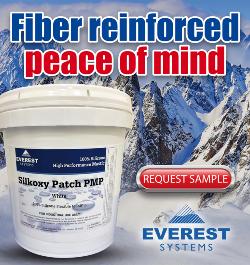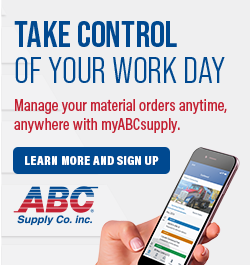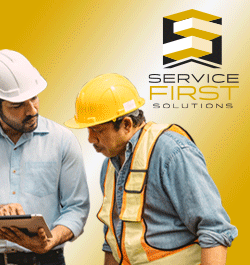Stories From the Roof - Laurie Moore - Kreiling Roofing Co - PODCAST TRANSCRIPTION
May 14, 2023 at 7:00 a.m.Editor's note: The following is the transcript of a live interview with Laurie Moore from Kreiling Roofing Co. You can read the interview below or listen to the podcast.
Speaker 1: Welcome to Stories From the Roof, from rooferscoffeeshop.com, where we tell the stories of roofing professionals from around the globe.
Heidi J. Ellsworth: Welcome to Stories From the Roof. My name is Heidi Ellsworth, and you are at Roofers Coffee Shop. Stories From the Roof is celebrating roofing contractors. We are so excited to bring their stories to all of you every day and really share what is important, how they got here, and just overall roofing respect. So today, I am so honored to have Laurie Moore here from Kreiling Roofing. Laurie, welcome to Stories From the Roof.
Laurie Moore: Thanks.
Heidi J. Ellsworth: This is exciting.
Laurie Moore: It is.
Heidi J. Ellsworth: We've known each other for a long time and we are so involved with different organizations and doing everything, but to really hear your overall story, I'm super excited to be able to share that.
Laurie Moore: Aw, thanks.
Heidi J. Ellsworth: So, okay, let's get started. First of all, if you could introduce yourself, your company, and just kind of your overall roofing industry experience.
Laurie Moore: I guess, starting with the company, it's a hundred-year-old union company in Peoria, Illinois. We have about 125 employees, and we do a pretty wide variety of types of roofing. We do industrial, single ply and modified, as well as pretty complicated steep slope work, that includes slate tile and wood shakes. And then we also have a custom architectural sheet metal department as well.
Heidi J. Ellsworth: Wow.
Laurie Moore: So there's a lot going on, but the good thing about that is when certain markets are up, others are down, and that kind of helps us have a smooth curve in our activities. So that's been a really good advantage for us.
Heidi J. Ellsworth: Yeah. How did you get into roofing?
Laurie Moore: That's kind of a loaded question so, because I've been in it, around it pretty much my whole life. But I remember when I was about five, I went to the office on Saturday mornings with my dad, and then we would visit the crews on the way home. And then worked in the office in high school, and also in my last years of college. Which obviously, I wasn't doing a lot of productive things when I was five, but just seeing my dad at work and how things were done on the roof and in the office, I suppose you learn things as you see them and hear things. So it's what I knew. It always seemed normal to me to be around that. So after college, I continued working at the company and started working in the office and playing some primary roles, processing accounts payable, accounts receivable. They let me take full control of the typewriter at the time, so it was all office work.
But as I did that, and I was primary to our communications proposals and things like that, on the typewriter at the time, and of course I knew there was a better way to do that, and I wanted to get us more into the computer age at that point. But along the way, I really didn't understand the technical details of what I was typing. And so, I started asking questions and I got some explanations that were hard to understand, being shown a pile of rock and some kegs of asphalt, and then pallets of rolls, and here's a picture of how we do this. And I said, "Yeah, I don't really understand how a tapered insulation package gets put together. I don't really know how long it takes to do these details. How am I going to understand it, unless I actually do it?" And so, for about six months, I was able to work on the roof.
I had to argue my way into this opportunity. Nobody really in my family wanted me to do this. I don't know that anybody on the roof wanted me to do it, but it was my way to understand what was happening and how things were done, and how long does it take, and what's the right way and the wrong way to do things. So that really helped me get in my head, how does this work?
Heidi J. Ellsworth: Yeah, that makes so much sense. Yeah, I mean, you kind of got to get your hands on it to really understand it.
Laurie Moore: Well, I do anyway. It was the best way for me to understand it. So after a couple of years of being in the office then, I got married and had kids. And at the time, there was really no encouragement to be involved in the business and, "Well, someone else can do this and you don't need to do this. You could just stay home with your kids." And it was important to me to do that. I did some part-time things here and there during that time with collection or just some data entry or helping implement a new software, since I helped implement the DOS program we had in the early nineties.
Heidi J. Ellsworth: Yeah. I remember that.
Laurie Moore: We moved on to some Windows programs after that. But just kept my toes in, trying to keep on top of what was going on in the company while I was at home with kids for 15 years. And didn't come back in, in any significant role until in 2005. My brother, who was the other owner at the time, decided that he was done with his career there, and then the opportunity came up to either buy or sell my shares. So I chose to buy for reasons, maybe not well-founded at the time, but oh, I can just have this sense of, I think I can do this. I always thought I could do something in the company. I'm not sure I wanted to start with that role, but that was the role that was available, and that's the one I took.
Heidi J. Ellsworth: That's awesome.
Laurie Moore: Came back in and during a transition, it's pretty common for people to take that opportunity to move on to other things if they're kind of near that point in their lives, and there was a lot of that. So our accountant was one of them, and I figured I'd better get ahold of that role. So that's the one I took. And having some accounting education in college, I was an accounting major my first three years of college, so that was okay. That suited me okay at the time. And having done some of the other office roles, I was pretty familiar with our processes. So anyway, that was sort of the first leg of that experience.
Heidi J. Ellsworth: Yeah. Well, and what I love is you're really kind of talking too, about your overall career. And I had same thing. As women in business overall, it wasn't as easy before to incorporate both, but to hear the commitment to your family, to your kids, I had similar experiences. And then, to be able to come back and do what you're doing. So how do you see from a roofing career, from buying your shares and the accounting then, where have you gone? How has that growth to your current role, which I don't think we said at the beginning, but owner and CEO of the business, how did that happen?
Laurie Moore: Once you realized that you have to sink or swim and it was 2000, oh, heading into 2008 during this process, and knew that we had been in a boom and what goes up must come down. And knowing that I had a lot of long-standing habits to deal with and just the direction of the company, it was really like the Titanic heading for an iceberg. And you don't know if you're going to hit it or not, so you just take a hold with both hands and really try to steer it, just look at everything. I think of it kind of like a person who wants to lose weight. You can't just lose weight from one part of your body, and the company is the same way. And I learned to just try to make small adjustments where I saw things that were necessary and could change easily, and just try to keep making those adjustments to help steer us and hopefully survive.
So, it started out as survival mode, and as I learned things, which I was having to dig and learn every day to make sure that we were staying afloat, I would train somebody right behind me so I would make sure that this is happening and I know what we're doing here, and then I would train someone else to do it. And then I would move on to another area of the company and do the same thing.
Heidi J. Ellsworth: Yeah, smart.
Laurie Moore: A lot of processes that weren't documented at the time. There were a lot of things that structurally, that needed to be put back together so that we could operate from a position of strength. And when 2008 hit, instead of downsizing during that time, I took that time to train and strengthen our core. So that was actually an advantage to us to have that time to do that.
Heidi J. Ellsworth: Wow. That's cool. Yeah, A lot of people were, 2008, 2009, very scary times. But you took advantage of it.
Laurie Moore: Yes. Well, it's what we needed and it worked well for us. But I just really felt like I was, couldn't really leave my position there to go to educational things at the time. I felt like, "Oh, if I walk away for a day or a week, what's going to happen?" So yeah, it was just nose to the grindstone and figure it out myself. And I used a lot of the manufacturer's websites and their technical information, the NRC manuals, I read all of them. And that is one of my strengths, so I used that strength to help us survive during that time. And it wasn't until about 2014 that I looked up from my desk and I thought, "Well, I could probably go to some conferences and things. I should probably do that." And 2014 was also the year that I was asked to participate in the MRCA Board.
Heidi J. Ellsworth: Okay. That's where we met.
Laurie Moore: Yes, I was kind of surprised. I thought, "Well, I certainly feel like I come at this industry from a little different perspective than most of the guys I know." A lot of guys are superintendents or estimators, and have maybe worked in the field or whatever. And I thought, "Oh, I don't know if they're going to really be interested in anything I had to say, or if my contribution's going to be helpful." I had that anxiety sort of about. What is it that I have that is helpful here, because if you're going to spend your time, you want to be helpful.
So what I learned was that we all have a different direction that we come to this industry from. We have different skills, different knowledge, and different perspectives, and that's really a very healthy mix for a group, because that group becomes more well-rounded when you bring different people's perceptions, skills, and knowledge together. So I really felt like it was a good thing for me. I felt like my participation was welcomed and it had value.
And also, just all the resources of people that I met, that I was able to talk to about, "Well, what's going on with this and what do I do about that? And how do you do this?" And that was invaluable to me at the time. And it took the weight off. It took some of that fear and anxiety out, as far as wanting to survive at that point. And I felt like if there was anything that I needed help with or something that happened, which something always happens in roofing, so there's always going to be somebody else who's dealt with it and can help you figure out what to do.
Heidi J. Ellsworth: Yeah, yeah. Wow, that is cool. Along that line, and I mean, you've said so many things now as we've gone through it, the fact that at five years old, working on the roof and nobody was really excited about that, but who would you say taught you about roofing?
Laurie Moore: Okay, who taught me about roofing?
Heidi J. Ellsworth: Yeah, I guess how to roof or about the roofing industry? It's kind of two different questions, so.
Laurie Moore: Yeah. Well, obviously the foreman that I had on the roof, was who taught me how to do roofing at that point, and unfortunately it was BUR with gravel. So that didn't take me very far into the 2000s, since we really flipped to the single ply. I guess a lot of the people at my company really are the people that I depended on, the installers. I guess that's kind of how we came up with the idea to do the session on cross-training at MRCA, because we don't all have the same expertise.
So especially in this day and age, when people change jobs more often, you're not going to have this one person that's just going to stay at your company forever. So how do we get people trained? Well, we learn from each other. So that I think, has been one of the most helpful things.
We had a superintendent at our company that had been there for maybe 35 years at the time, and he had been a foreman and then became our superintendent. And he and I had daily discussions, and he would draw things out for me and I would tell him about the technical side that I knew. And he would share with me the field application and take me out on the job, and we would talk about it and talk to the foreman about it. And I think that's where I really got more of that hands-on knowledge, was from discussions with him and with the other foreman.
Heidi J. Ellsworth: That's so cool. That's so cool. From all of that, what were some of the most valuable lessons you learned about roofing and across the board?
Laurie Moore: I think what I learned was, first of all, that I like to seek problems and solve them. But also, that there's always somebody else who's had experience with a similar struggle and that, surprisingly, a lot of other people are usually happy to help. You don't always want to bother somebody, but every time I've asked, everybody's been happy to help. So that's not specific to roofing obviously, but just generally, the people in the industry have been really helpful.
Heidi J. Ellsworth: You know what, I have to say too, I think that's so invaluable. You have to be able to ask questions and not let that get in your way. Not thinking, it's okay not to know.
Laurie Moore: Right, absolutely. I think people are afraid that someone will think they don't know something. Well, we don't all know everything, so that's okay.
Heidi J. Ellsworth: Yeah, we don't. It's so true. Okay. If you were to go back and start at the beginning of your career, what would you do differently?
Laurie Moore: Well, I would've reached out sooner for sure, because those first years from 2005 to '13 or '14, when I started getting involved with some of the groups, those were pretty hard years. And lonely, and just, you feel like you're the only one who does this. And at the time, I didn't know any other women who did this. And not to say that I don't have anything in common with guys, I do, but it just makes it a little different, I think, as far as being maybe unsure and not sure if people want to be bothered.
So I would've asked more questions, I would've gotten connected sooner. I think, if you're feeling shy about participation, realizing that no one runs a perfect company or knows everything, it helps. That variety in human perspective, skills and knowledge brings value to a group and to a conversation. Participation in the groups has been really a key in my learning experience, and I really appreciate the help that I received, and I enjoy being capable of helping others. I think that's been really important to me.
Speaker 1: Roofers Coffee Shop invites roofing companies to join a community built just for them. To find the things you need, learn a little, and socialize with the people who understand you most. It includes a fully interactive online directory, access to Ask a Roofer, to answer questions and engage with owners, discounts on classified, consulting benefits, and a monthly coffee break with industry peers and experts. Join the R Club for only $50 per month, with access for all employees. 10% of the membership fee is donated to one of seven industry related charities. So go to www.rooferscoffeeshop.com to join the R Club today.
Heidi J. Ellsworth: We have such an amazing industry in the roofing industry, and there's so many people who want to help each other. But until you take that step and get involved, you don't know. And then once you do, you're like, "Why haven't I been doing this all along?" Okay. So what is the best thing you ever did for your business/career?
Laurie Moore: Well, I think working on the roof was more important than I ever thought it was. My whole reason for doing that was so that I could understand. I didn't really expect it to have any value, other than the work I did on the roof. But because I had that experience, and surprisingly, people still know that I did that, which it's been 33 years or something, maybe more. But I never realized that that would be something that people would respect. I didn't think it was anything special. I just thought it was something normal that you would do if you were going to be in this business. It was just different at the time, because we didn't have a lot of women on the list then, and that was like a thing.
But doing all the parts of the office processes, knowing what all is involved there, understanding how all of that works together with the accounting position. Being able to see how the operations impact the financials directly, and how making small changes could make a big difference. Learning about how other people are doing things and finding ways to improve. All those things, I think, have helped me have a different perspective and form my own perspectives, and have some confidence in what I think needs to be changed and go in that direction until you find a better way.
Heidi J. Ellsworth: Yeah. No, I think that's so true. And I know, to be able to look back and say, "I worked on a roof. I know what's going on here. Not only have I worked in the company, but up on the roof," and a lot of times people aren't given that chance. So I think it's really cool that you grabbed that. Okay, next question. What is the most important trait in an employee or coworker for you?
Laurie Moore: Everybody has their different personalities, and I try to help people maximize their strengths and minimize their weaknesses. And I tend not to look at people in just traditional roles, because obviously it's not been traditional for me. And I've seen lots of people maybe not do great over here, but do really well in another area. Just sometimes takes little understanding.
But overall, accountability. Somebody who's going to take hold of something. These are small companies. The scopes are not always that narrow. Sometimes you're dealing with a little bit of gap and overlap. It's important to know that, that person in that role is going to take care of it and ask questions about, "okay, make sure it gets to the next area or the next process." That takes a willingness to support and protect the company and its customers. I mean, you want people who are going to be forgiving sometimes or kind to other people, realizing that we're not all perfect. We don't all have perfect understanding of what everybody else is talking about all the time. So taking the time to communicate and figure out what needs to be done, without maybe automatically just sort of reacting to it. Try to have some understanding there and try to understand, "Okay, must be a disconnect here. Let's figure it out."
Heidi J. Ellsworth: We need more of that overall.
Laurie Moore: Well, it helps.
Heidi J. Ellsworth: It does. It does. It helps a lot. Okay. Who was the best boss you ever had and what did they teach you?
Laurie Moore: Well, when I was thinking about this, I thought, I haven't had a whole lot of bosses. I've had a few, but in this company, I'm thinking about my dad because although I didn't have a lot of years to work with him closely, I lived with him for 20 years or 18 years and knew him pretty well. His character anyway. And so, the word integrity came to mind, truly caring about others. But integrity, I just noticed this today, it has the letters, G-R-I-T in the middle of it. And I'm like, "Oh, gritty. Yeah, there's a little bit of grit there." And so although you truly care about others and how they feel, sometimes you have to have a little bit of grit to be the protector of the group as whole.
And I find that a lot of things apply to customers and employees. This whole concept, we're going to protect our customers from liability or from unpleasant experiences. So there's that protective sort of attitude towards customers as well as employees. We're going to protect the employees as a group as well, and try to identify when somebody's maybe outside the group and wants to go their own way. You know what? That's okay. They're come in line with us, get on the bus. Or, that's okay. You're going in a different direction, and we are too. And that's okay. And so I've learned to recognize that timing of when that becomes apparent. But, integrity means a lot of things. It also means knowing yourself, knowing who you are, recognizing your strengths and weaknesses, knowing who you are as a company, and standing by those things.
Heidi J. Ellsworth: Yes. So I love that. I love it. And it kind of goes back to what you said earlier, there's a real theme here, accountability. I love that. The accountability to your customers, to your employees, to protect them, and overall integrity. That's awesome. What makes you smile when you think about your job?
Laurie Moore: I never really thought I'd be in this position. I don't think I imagined, this would be the position I would be in, but here I am. I don't think this was my dad's succession plan. His succession plan was for my brother to be in this position. I don't think anybody looked beyond that too much, but here I am. So I look back and see how much I've learned and done to take, change the company. Sometimes I look back and I go, "Wow, we are really somewhere different than we used to be. Things in this area are so much better. And look at all we're doing now and how sophisticated this business has become. Oh my gosh." And then, I sort of pause, and then it's like I just turn around and look the other way and go, "Wow, we still have a lot to do and there's a lot to learn, and we still have all these things that we want to do to improve." So it's sort of that, "Well, let me take a minute and look back. Okay, let's go forward and continue working."
Heidi J. Ellsworth: It never stops. It never, it's always there in business.
Laurie Moore: No. And in this industry, for whatever reason, it's almost seems to be like an addiction or something because I mean, if you took your common sense and you looked at all the liability there is in this business, I'm not sure how many people would be left. So there has to be some emotional attachment to it or something.
Heidi J. Ellsworth: Well, I love it. I love that you were not expected, but look at what a amazing success. And I think that says a lot for a lot of kids who grew up thinking, "Well, this person has to do that and this person has to do that," and all of a sudden, "Nope. We can do wherever it leads us."
Laurie Moore: And that's why I look for people who are showing strengths and maybe not in the traditional position, but why does it have to be traditional? I mean, sometimes you got to let go of beliefs that don't make sense anymore, and that's okay. Recognizing your own value, other people's value. What are the things that are easy for me, or give me joy or give me energy, and how do I get more of that? Because really, I can be a higher value to the company and to others if I'm doing something that I feel is something I'm interested in. And it gives me energy. And I think other people have the same experience, if you give them the opportunities to do that.
Heidi J. Ellsworth: Any tips for new people starting out in roofing?
Laurie Moore: Yes. I think I've learned this myself, and I try to voice it when I have the opportunity. Do the things that you expect to manage. Do them yourself so you can understand the challenges people will have, and that will help you be a better manager of that. The other thing I'm big on is continuing education, always looking for better ways to thrive, survive, and try to look ahead and see what changes I need to be ready for. Those are always going to be my recommendations. I don't see those changing too much. Like that's a constant.
Heidi J. Ellsworth: Those are so important.
Laurie Moore: Yeah. Have that experience yourself, so you understand. Also, makes you a little bit empathetic maybe.
Heidi J. Ellsworth: Yeah, exactly. Exactly.
Laurie Moore: When somebody doesn't do it perfectly, then you know what questions to ask too. "How can I help you?" I can't help you if I don't understand maybe what the challenge is, so help me understand. So I can help make this better. That's more of my problem solving sort of approach. It's like a puzzle, and you take it apart and you look at each piece individually, and then you try to put the pieces back together to make it a better picture. Little bit of a creative endeavor sometimes.
Heidi J. Ellsworth: It is. It is. And it's not always easy and it's a little messy, but because you've done it, you can at least have that conversation with someone who's learning it. And empathy, that's so important.
Laurie Moore: Right. And I had somebody ask me, I said, "Well, we're going to try this, this year." And he said, "Well, we tried that last year and it didn't work." And I said, "Well, but we have better support in place this year. I think it's going to work this year when we try it again, but because I recognize some pieces that were missing before." And, I said, "Now that we have these pieces in place, let's try it again. But if it doesn't work, then we'll just make some adjustments to it. We'll keep trying," because you can't just throw the baby out with the bath water. You got to make these adjustments. And sometimes you have to take a step backwards, and that's okay. That doesn't mean it's a complete failure. It just means maybe you weren't prepared to do it well the first time, and maybe it's still the right direction. Maybe it's not the right direction at all. You just got to kind of look at, "Okay, just because we've tried that before doesn't mean it's a bad idea."
Heidi J. Ellsworth: Right.
Laurie Moore: It just means we didn't have all the pieces in place, so.
Heidi J. Ellsworth: At that time. And year over year, look how much things change. Everything changes so fast nowadays.
Laurie Moore: Well, and maybe I learned part of the idea to implement, and I didn't have the whole picture in place. Maybe I was missing some pieces. So as I talked to people and hear what other people are doing, it's like, "Oh, well maybe this didn't work because I didn't have this other piece that they have in place."
Heidi J. Ellsworth: Exactly. That's so smart. That's so smart. Well, Laurie, I love it. Thank you for all your wisdom. These are great, great comments, great tips for everyone. So one of our last questions that we like to ask is about Roofer's Coffee Shop, and how you heard of us. So you can tell a funny story or you can say, "Nope, I didn't even know about it until Heidi, you told me five years or a year ago," or whatever it was. But if you have any favorites or any stories you want to tell about getting to know Roofer's Coffee Shop.
Laurie Moore: Heidi, I've known you for a long time. I knew I about Roofer's Coffee Shop. I haven't really added Roofer's Coffee Shop to my regular schedule, but I know it's there. And as I look at it, there's an awful lot there to offer. So for me, I start looking at the technical and some of the how-to things, and I think, "Oh, that'd be interesting." Then I'm like, "Well, EOS is interesting too though." Yeah. And I love to read, so I love that there's a reading list. So there's a lot there. Sometimes you just have to decide to put things in a schedule and decide, "Okay, if this is my new habit, then how often am I going to do it? When is that time?" And just kind of integrate it. Otherwise, sometimes it just doesn't happen.
Heidi J. Ellsworth: Yeah. I'm telling you, that's why this podcast, some people will only listen to this podcast, and some people maybe, pour a cup of coffee and read articles every morning. But however they get involved, I'm just glad that you're here to share your knowledge with everybody out there. And that we do know each other and we are a part. And both of us, I mean, we get to spend so much time at the shows, and MRCA and IRE. And I think that, that give back that you do every single day, you are giving back so much. So I just want to say, thank you.
Laurie Moore: Well, thanks. I think that a lot of us on the boards, we feel like we walk away with as much or more than we put into it, and I think that's a lot of the reason we're all there.
Heidi J. Ellsworth: Yeah. Yeah. You learn so much. I learn something every day. Well, Laurie, thank you. And actually, this podcast came all about because of the MRCA auction, because of the MRCA show. So again, thank you. Thank you for all your support and great wisdom. This has been so much fun.
Laurie Moore: Thanks.
Heidi J. Ellsworth: Thank you.
Laurie Moore: Thanks for having me, Heidi.
Heidi J. Ellsworth: I love it. I love it. And thank all of you for listening. These kind of stories, I hope it just inspires you as much as it inspires me. I'd love to hear how everybody got into roofing, their roofing career, their journey, and all the great wisdom. So keep joining us for all Stories From the Roof. You can find them under the read list and watch initiative on Roofer's Coffee Shop, or on your favorite podcast channel. Be sure to subscribe and get those notifications so you don't miss a single one. And we'll be seeing you next time on Stories From the Roof.
Speaker 1: Thanks for listening to Stories from the Roof, from rooferscoffeeshop.com. Make sure to subscribe and leave a review.
Recommended For You

John Kenney - Mastering Roof Estimating - PODCAST TRANSCRIPT
Read More ...
Rachel Pinkus, Bill Seibert & Robert (Bob) Poutre - Get Ready for the Premier Roofing Show of the Midwest - PODCAST TRANSCRIPTION
Read More ...
James Mason and Eric Cieslak - The Future of Rooftop Solar - PODCAST TRANSCRIPTION
Read More ...



















Comments
Leave a Reply
Have an account? Login to leave a comment!
Sign In